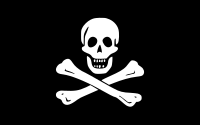User:Auric/Pirate English dialect
| This is not a Wikipedia article: It is an individual user's work-in-progress page, and may be incomplete and/or unreliable. For guidance on developing this draft, see Wikipedia:So you made a userspace draft. Find sources: Google (books · news · scholar · free images · WP refs) · FENS · JSTOR · TWL |
| Pirate English | |
|---|---|
| (International) | |
 | |
| Era | Age of Sail |
Early form | |
| English | |
| Flag Code | |
| Sources | West County English |
| Language codes | |
| ISO 639-3 | – |
| Glottolog | stan1293 Pirate English |
Pirate English is a modern dialect, based around the language that pirates are supposed to have used. It has similarities with West Country English.
Linguistic background
[edit]English actor Robert Newton, who specialized in portraying pirates, especially Long John Silver in the 1950 Disney film Treasure Island and the 1954 Australian film Long John Silver and the title character in the 1952 film Blackbeard the Pirate, was born in Dorset and educated in Cornwall, and it was his native West Country dialect, which he used in his portrayal of Long John Silver and Blackbeard, contributing to the standard "pirate accent".[1]
The archetypal pirate word "Arrr!" (alternatively "Rrrr!" or "Yarrr!"), which in West Country parlance means "yes",[2] first appeared in fiction as early as 1934 in the film Treasure Island starring Lionel Barrymore,[3] and was used by a character in the 1940 novel Adam Penfeather, Buccaneer by Jeffery Farnol.[3] However, it was Robert Newton's use of it in the classic 1950 Disney film Treasure Island that popularized the interjection and made it widely remembered. It has been speculated that the rolling "rrr", a distinctive element of the speech of the West Country of England, has been associated with pirates because of the West Country's strong maritime heritage, where for many centuries fishing was the main industry (and smuggling a major unofficial one), and where there were several major ports. As a result, West Country speech in general, and Cornish speech in particular, may have been a major influence on a generalized British nautical speech.[4]
Modern usage
[edit]- Google Search and Facebook both have the option to choose "Pirate" as a language choice.[5]
- Antivirus provider Avast has, since 2011, permitted users to select "Pirate Talk" as a language option.[6]
- If the 2004 version of SId Meier's Pirates is played on September 19, the in-game dialogue will contain pirate speech.
- On January 5, 2012, Minecraft added a "Pirate Speak" language option (en_pt).[7]
References
[edit]- ^ Dan Parry (2006). "Blackbeard: The Real Pirate of the Caribbean". p. 174. National Maritime Museum
- ^ Robinson, Matthew (September 19, 2013). "Ahoy, matey! Is the pirate life for you?". Vancouver Sun. Retrieved July 18, 2017.
Author interviews Molly Babel, a linguist. Babel: "Speakers of the regional dialect tend to emphasize their r's, unlike other British regions, said Babel. They tend to replace the verbs 'is' and 'are' with 'be', and indeed, use the word ¿arrr¿ in place of 'yes'."
- ^ a b Bonanos, Christopher (June 5, 2007). "Did Pirates Really Say "Arrrr"? The origin of Hollywood's high-seas slang". Slate. Washington Post Newsweek Interactive Co. Retrieved September 16, 2007.
- ^ "R!?". Language Log, September 19, 2005.
- ^ Chris Gaylord (September 19, 2011). "Talk Like a Pirate Day: How to have Google, Facebook join in". The Christian Science Monitor.
- ^ Lyle Frink (September 17, 2010). "avast! has over 3,000 pirates safely aboard". avast.com. Archived from the original on September 20, 2010.
- ^ "Language". Minecraft Wiki. Retrieved 2017-09-19.
Further reading
[edit]- Harland, John (1984). Seamanship in the Age of Sail. Provides a detailed account of the language used by seamen during the age of sail. ISBN 0-87021-955-3
- William Clark Russell (1883). Sailors' Language. Dictionary of 19th century sailors' language.

